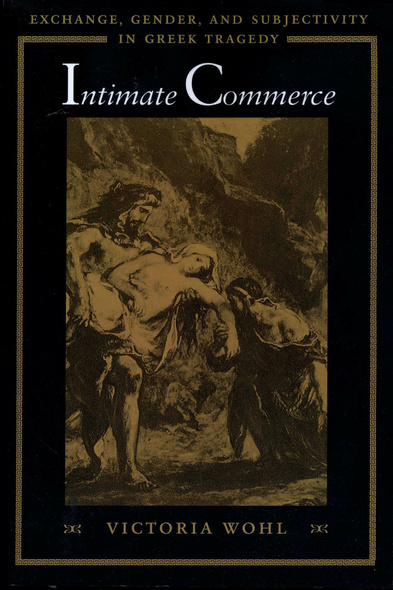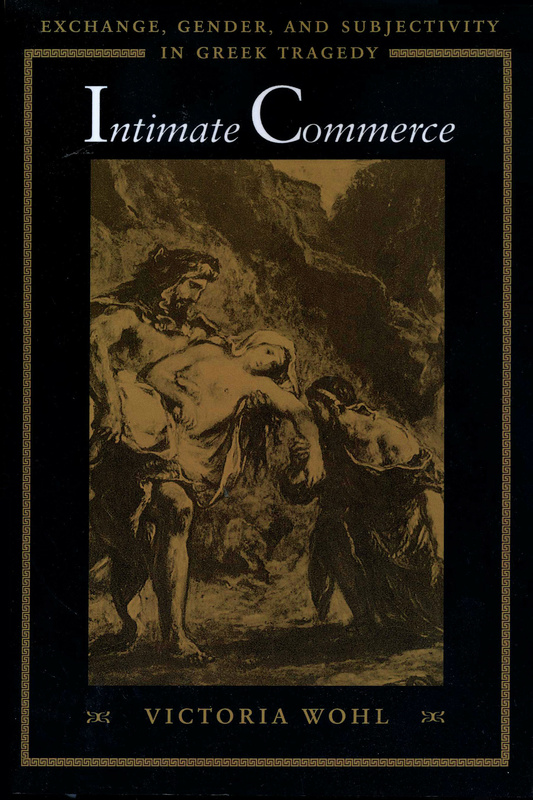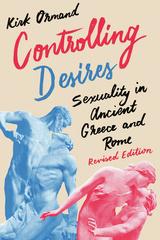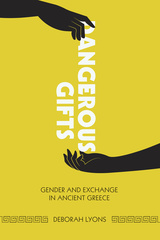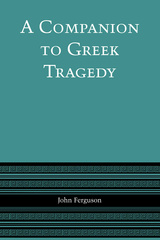Intimate Commerce
Exchange, Gender, and Subjectivity in Greek Tragedy
Exchanges of women between men occur regularly in Greek tragedy—and almost always with catastrophic results. Instead of cementing bonds between men, such exchanges rend them. They allow women, who should be silent objects, to become monstrous subjects, while men often end up as lifeless corpses. But why do the tragedies always represent the transferal of women as disastrous?
Victoria Wohl offers an illuminating analysis of the exchange of women in Sophocles' Trachiniae, Aeschylus' Agamemnon, and Euripides' Alcestis. She shows how the attempts of women in these plays to become active subjects rather than passive objects of exchange inevitably fail. While these failures seem to validate male hegemony, the women's actions, however futile, blur the distinction between male subject and female object, calling into question the very nature of the tragic self. What the tragedies thus present, Wohl asserts, is not only an affirmation of Athens' reigning ideologies (including its gender hierarchy) but also the possibility of resistance to them and the imagination of alternatives.
Victoria Wohl is a professor of classics at the University of Toronto.
- Acknowledgments
- Introduction. Exchange, Gender, and Subjectivity
- The Tragic Exchange
- Reaffirmation, Resistance, Negotiation
- The Social Economy of Exchange
- The Subject of Exchange
- Part One. Sovereign Father and Female Subject in Sophocles’ Trachiniae
- One. “The Noblest Law”: The Paternal Symbolic and Its Reluctant Subject
- The Final Exchange
- Heracles: Subject under Siege
- Hyllus: The Reluctant Ephebe
- Two. The Foreclosed Female Subject
- Iole, Deianira, and the Triangle of Exchange
- Anti dōrōn dōta: Deianira’s Gift-Giving
- Status and Gender
- A Woman’s kleos
- Three. Alterity and Intersubjectivity
- Interpellation of the Other, Creation of the Self
- Spatial Models of Self and Other: Pandora and kalokagathia
- The Virgin in the Garden
- One. “The Noblest Law”: The Paternal Symbolic and Its Reluctant Subject
- Part Two. The Violence of kharis In Aeschylus’s Agamemnon
- Four. The Commodity Fetish and the Agalmatization of the Virgin Daughter
- Marx and the Fetishized Economy
- The Occluded Exchange
- The Agalmatization of the Virgin Daughter
- Five. Agalma ploutou: Accounting for Helen
- The Disenchantment of the agalma
- Khrusamoibos sōmatōn: The Commodification of the Male Subject
- Six. Fear and Pity: Clytemnestra and Cassandra
- Androboulon kear: Clytemnestra’s Transgressive Identity
- A Lament for the Father
- Four. The Commodity Fetish and the Agalmatization of the Virgin Daughter
- Part Three. Mourning and Matricide in Euripides’ Alcestis
- Seven. The Shadow of the Object: Loss, Mourning, and Reparation
- Eight. Agonistic Identity and the Superlative Subject
- The Matriarch of the oikos and Alcestis’s Domestic Politics
- The Superlative Subject and Her Husband
- From Tragedy to the Symposium
- Nine. The Mirror of xenia and the Paternal Symbolic
- From Impossible kharis to the agalma Economy
- From physis to praxis
- Heracles and the Mirror of xenia
- The Final Exchange
- Conclusion. Too Intimate Commerce
- Notes
- Bibliography
- General Index
- Index Locorum

